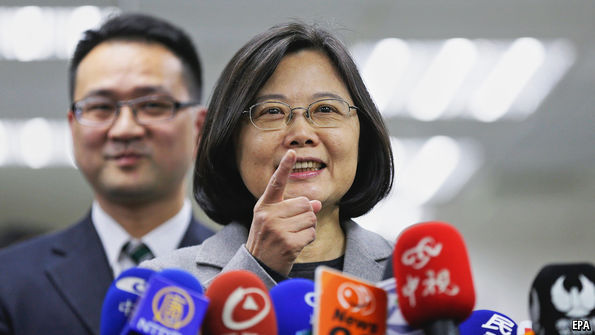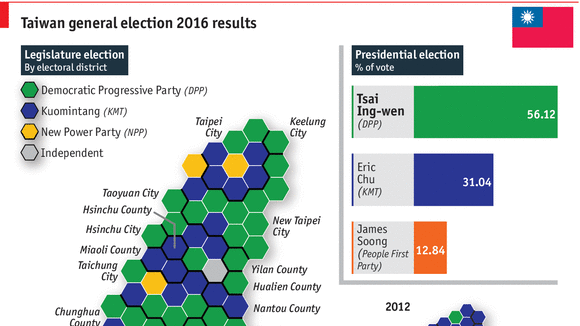Taiwan’s remarkable election
Dear prudence
By rights, Taiwan should be a fully sovereign country today; Tsai Ing-wen must accept that it cannot yet be oneJan 23rd 2016 | From the print edition

IT HAD been widely predicted, yet the landslide victory for Tsai Ing-wen in Taiwan’s presidential race on January 16th, along with the emphatic performance of her Democratic Progressive Party (DPP) in the legislative election, is nevertheless remarkable (see article). The vibrancy of the campaigning; the engagement of young voters; a smooth expected transfer of power; Asia’s first female leader not to come from a political dynasty: there is much to celebrate. A dictatorship has budded amazingly into a mature democracy, a country with stable institutions and impressive prosperity, ranking 33rd in the world by income per person, richer than Portugal or Greece.
Rightly, neighbours have been quick to congratulate Ms Tsai. All, that is, except powerful China, which deems Taiwan to be a renegade province that must return to the motherland, and if necessary be forced to. For all that Taiwanese resent being dictated to, and Ms Tsai’s own party leans towards formal independence, the new president must accept that history constrains Taiwanese aspirations, and her options. Not to do so would jeopardise Taiwan’s future—and the region’s peace.
The Taiwanese, for the most part, voted for Ms Tsai not on the “one-China question” but to improve living standards at home, as voters in mature democracies tend to. A donnish expert on trade law, Ms Tsai picked up a party in tatters in 2008 after its first, disastrous, presidency. Since then the DPP, founded by human-rights activists persecuted during the thuggish days of the Nationalist or Kuomintang (KMT) dictatorship, has shown growing competence in local government. Competence, not political ideology, is how it smashed the KMT’s unbroken lock on the legislature. The KMT’s once-mighty machine, built on cash and cronyism, has hit the buffers; it faces a Herculean task to reinvent itself along more modern lines.

Daily chart: All change in Taiwanese politics
China’s Communist Party, much happier to deal with its old KMT foe than with the DPP, is displeased. But at least it is not fulminating (see Banyan). Ms Tsai should swiftly demonstrate to President Xi Jinping that her priority is not to seek to upset the balance across the strait but to take on domestic concerns: build more affordable housing, fix the crisis in the pensions system and raise the minimum wage. She should do more to liberalise the economy and remove obstacles to the creation of new businesses.
Yet she cannot ignore relations with the mainland altogether. Indeed they may yet come to define her presidency. Not least, China is Taiwan’s biggest trading partner. Ms Tsai has promised transparency in trade and investment deals with China. The KMT’s secrecy sparked protests two years ago that greatly undermined Ma Ying-jeou, the outgoing president. His successor must find ways to explain to autocrats, who themselves rule opaquely, why more scrutiny of agreements will lead to their greater acceptance in Taiwan. And when it comes to her promise to seek membership of the American-led free-trade area, the Trans-Pacific Partnership, she should urge China to join the club in tandem, as the two countries did when they entered the World Trade Organisation in 2002.
Swallow your pride, Ms Tsai
Sooner or later China will press Ms Tsai to affirm the formula that has guided cross-strait relations: that there is but “one China”, even if both sides disagree as to quite what that means. This will be hard for her, given that such a fudge does not reflect the changing view of compatriots increasingly inclined to think of themselves as Taiwanese, not Chinese. Yet she must continue the reconciliation across the strait that began under Mr Ma. Even before her inauguration in May, she should offer to meet Mr Xi for a meeting of no preconditions. Throughout, her watchword should be patience. Real, de jure sovereignty for Taiwan can probably come only if a thuggish China, today persecuting rights activists, evolves into a more liberal state. Impossible? Taiwan has done it.
From the print edition: Leaders
http://www.storm.mg/article/79747
2016年1月16日,中華民國舉行第14屆的總統選舉,由民進黨提名的蔡英文與陳建仁以689萬餘票當選,完成了中華民國來台後第三次的政黨輪替。英國《經濟學人》為此以《Dear Prudence,本為英國樂團披頭四1968年的作品,歌詞鼓勵在印度修行的Prudence Farrow,別忘了探頭看看窗外的藍天》為題撰文,除對這次選舉語多稱讚外,也盼蔡英文在就任後,正視限縮台灣國際空間的兩岸框架歷史,避免危及台灣未來,甚至是區域和平。
非政治世家出身的女總統
儘管結果早在預料之內,蔡英文在1月16日的壓倒性勝利,以及民進黨在立委選舉中的亮眼表現,仍就令人驚艷。這次選舉中,民進黨在年輕候選人的投入下,表現了高度的活力,並完成了和平的政黨輪替。
更值得慶賀的是,蔡英文即將成為亞洲首位非政治世家出身的女總統。這次的選舉,讓全世界看到,台灣已經從過去的獨裁統治國家,漸漸轉為一個擁有成熟民主機制、穩定制度,以及繁榮經濟的國家。在全球人均所得的排名中,臺灣甚至名列世界第33。
而在得知消息後,中共也很快地向蔡英文賀喜。???
其實,中共向來將台灣視為一個叛亂的省分,認為台灣必須儘早回歸中國,如果有必要的話,甚至不排除武力攻台。而台灣人則憎惡獨裁統治,蔡英文所代表的政黨本身也傾向獨立。然而,新總統必須要接受現況:歷史的發展限制了台灣和她自己的選擇。如果不正視這個現實,很可能會危及區域和平以及台灣的未來。
畢竟,比起勝選的民進黨,中共比較喜歡跟它的宿敵──國民黨打交道。儘管如此,中共這次並未做出猛烈的譴責,而蔡英文也應該儘快讓習近平了解,她的首要之務並非打破平衡的兩岸關係,而是關注在國內問題。蔡英文必須興建社會住宅、重整退休金制度,以及調高最低基本工資。她也要促使經濟自由發展,並創造良好的創業環境。
而大部分的台灣人投給蔡英文的原因,也並非出於主權問題。事實上,如同多數成熟民主國家的選民一樣,他們投給蔡英文的原因,是想要提升生活品質。
國民黨必須改造自己
蔡英文在2008年總統敗選後,便開始一步步重組當時四分五裂的民進黨。也正是從那時候開始,民進黨便在地方政府中表現自己的統治能力。而正是民進黨逐漸進步的統治能力,而非意識型態,讓它在立委選舉中擊敗國民黨。國民黨過去以金錢和私人關係建立的統治,已經面臨瓶頸,必須要以更現代的方式重塑自己。
審慎監督下的兩岸協議
然而,蔡英文也不能忽略兩岸關係。事實上,兩岸關係的處理,將會影響她的定位。更重要的是,中國也是台灣最大的貿易夥伴。
蔡英文曾經承諾,會和中國簽訂公開透明的貿易和投資協議。兩年前,國民黨的黑箱作業引爆三一八學運,更影響了馬英九的統治。蔡英文必須讓馬英九看到,對於條約更審慎的監督,會贏得人民更廣大的支持。此外,就像2002年加入世界貿易組織(World Trade Organization, WTO)的做法一樣,蔡英文也必須努力爭取和中國先後加入跨太平洋戰略經濟夥伴關係協議(Trans-Pacific Strategic Economic Partnership Agreement, TPP)。
繼續兩岸會談
中國遲早會向蔡英文施壓,要求她在兩岸問題上表態、承認一個中國的問題。而這對蔡英文而言,則是相當艱難的。
畢竟,越來越多人民認為自己是台灣人而非中國人。然而,她仍需繼續馬英九任內便開始的兩岸對談,而在就職典禮前,蔡英文或許應該不帶預設立場地會見習近平。畢竟,台灣主權能否被承認,端看中國能否從一個壓迫人權運動者的獨裁國家,變成一個更為自由的國家。
覺得不可能嗎?但台灣,就是個成功的例子。
沒有留言:
張貼留言